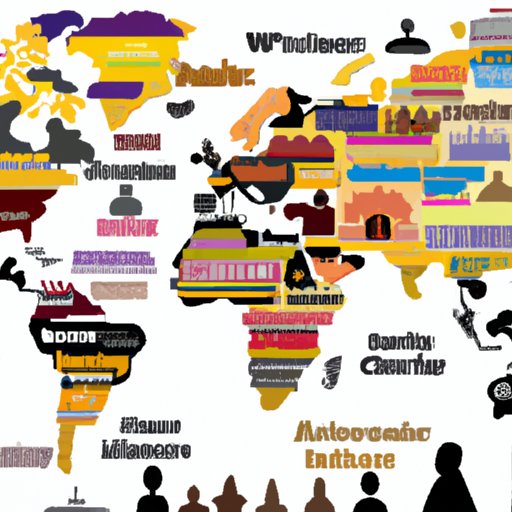Introduction
Culture is often referred to as “the way of life” of a particular group of people. It encompasses the beliefs, values, customs, practices, norms, and traditions that are shared by a particular community. This article will explore what is considered culture, from its historical development to its current interpretation. The impact of globalization on culture will be discussed, as well as how multiculturalism and religious beliefs shape culture. Finally, the implications of cultural diversity within a society will be analyzed.

A Historical Overview of Cultural Development
The history of culture can be traced back to prehistoric times, when humans first began to develop distinct ways of living. Early cultures were largely nomadic, relying on hunting and gathering for sustenance. As human populations grew, they began to settle in permanent locations and develop more complex cultures. In ancient times, civilizations such as those in Egypt, Greece, and Rome had developed their own unique cultures characterized by sophisticated language, literature, art, and architecture.
In modern times, cultures have become increasingly diverse and interdependent. Globalization has resulted in increased international trade and travel, which has led to the exchange of cultural ideas and practices. The influence of media and technology has also been a major factor in the spread of culture worldwide. While some traditional cultures remain intact, many others have been reshaped by modern influences.
Exploring the Definition of Culture
The term “culture” has long been the subject of debate among scholars. Traditional definitions of culture emphasize the shared beliefs and values of a particular group of people. Contemporary interpretations of culture focus on the various aspects of a society, including its language, art, music, literature, technology, and other forms of expression. Culture also includes the rituals, customs, and symbols that are used to communicate and identify with a particular group.

Examining the Impact of Globalization on Culture
Globalization has had a profound impact on culture. Increased international trade and travel has facilitated the exchange of cultural ideas and practices between different countries and regions. The influence of media and technology has also played a role in the spread of culture. For example, the Internet has made it possible for people to access information about different cultures from around the world.
Globalization has also led to a blurring of cultural boundaries. As cultures come into contact with one another, new forms of expression emerge. This can lead to the emergence of hybrid cultures, which combine elements of different cultures, or the adoption of foreign cultural practices by a particular group.

An Analysis of Multiculturalism and Its Effects
Multiculturalism is an important concept in today’s globalized world. It refers to the acceptance and celebration of different cultural backgrounds within a single society. Multiculturalism can bring about several benefits. For example, it can foster greater understanding and appreciation of different cultures, as well as promote tolerance and respect for cultural differences. At the same time, multiculturalism can also pose certain challenges, such as the potential for conflict between different cultural groups.
Discussing the Cultural Diversity Within a Society
The presence of cultural diversity within a society can have both social and political implications. On the one hand, it can lead to greater acceptance and understanding of different cultural backgrounds. On the other hand, it can create tension between different cultural groups if not properly managed. Cultural diversity can also have economic implications, as different cultural groups may have different needs and preferences when it comes to goods and services.
Investigating the Role of Religion in Shaping Culture
Religion is an important factor in shaping culture. Religious beliefs and traditions can have a powerful influence on a society’s culture. For example, religious holidays and rituals can provide a sense of identity and belonging to a particular group of people. Additionally, the relationship between religion and culture can be seen in the way certain religious beliefs and practices are adopted and adapted by different cultures over time.
Conclusion
This article has provided a comprehensive exploration of culture, from its historical development to its current interpretation. It has examined the impact of globalization on culture, as well as how multiculturalism and religious beliefs shape culture. Finally, it has discussed the implications of cultural diversity within a society. This article highlights the importance of understanding culture in order to gain insight into the complexities of our globalized world.
(Note: Is this article not meeting your expectations? Do you have knowledge or insights to share? Unlock new opportunities and expand your reach by joining our authors team. Click Registration to join us and share your expertise with our readers.)
